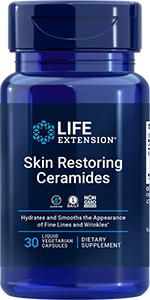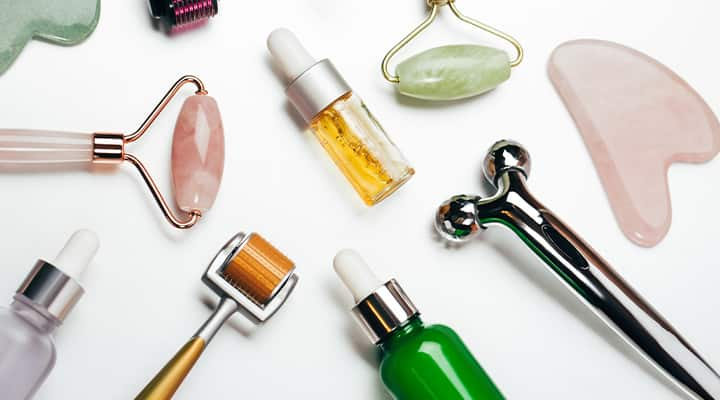
Ceramide Supplements: Are They Good for Your Skin?
Published: May 2021 | Updated: October 2024
You may have seen ceramides on the label of a skin care product, but what are ceramides and are ceramide supplements good for your skin?
Your body makes ceramides to keep your skin healthy, soft and supple, but like nearly everything else, we produce less of them as we age (hence, those fine lines, dry skin and other signs of skin aging that come with extra birthday candles). That's where plant ceramide supplements come in.
Let's talk about what they are, and why you could be missing out if you're not using this critical ingredient for radiant, hydrated skin.
What are ceramides?
In the body, ceramides are lipids on the outer-most layer of the skin's surface, or epidermis. These important fat molecules make up about two-fifths of the top layer of your skin and are responsible for creating an impermeable layer to lock in moisture, so your skin looks young and smooth and feels soft and supple. Ceramides are essential fatty acids for maintaining the integrity of your skin's barrier.
Adding plant-derived ceramides (or phytoceramides) to your skin care routine can help replenish skin ceramide levels, promoting healthy, hydrated skin. Your skin will thank you for it, whether you use plant-derived ceramides as oral supplements or topicals.
What are the benefits of ceramides for the skin?
These lipids are your "built-in moisturizers" and support your skin in three primary ways:
Keep it together
: Ceramides help bind together the skin cells that make up the surface of the epidermis.Shield and protect
: Ceramides contribute to your skin's barrier and help safeguard you against environmental factors that the day throws your way: dirt, pollution and oxidative stress.Skin's hydration retention
: Thanks to their protective role, ceramides not only protect your skin, but they also help lock in your skin's natural moisture.
In other words, when you use ceramides in your healthy-aging skin care routine, they can help replenish skin ceramide levels to support skin hydration and barrier function—so your skin will stay protected and youthful-looking, year after year.
Pro tip: Consistency is key. To see the best results, don't skip your daytime or nighttime routines—your skin cells will thank you for it.
How to support your ceramide levels as you age?
You can help protect your skin against age-related decline in ceramide levels and smooth the appearance of fine lines and wrinkles with plant ceramide supplements. Clinical studies have shown that using ceramide containing products, like plant ceramides, significantly helps increase skin hydration.
Explore Our Best Skin Care Products
Oral or topical formulations: which is better?
Now that you know the central role ceramides play in keeping your skin hydrated and smooth, which type should you add to your healthy-aging arsenal? The good news is that you can add both! Here's how they differ:
Topical ceramides
: They work by hydrating and restoring the skin's barrier function from the outside in. You'll see them in your daytime and nighttime skin care products like moisturizers.Oral ceramides
: These are convenient supplements that support healthy skin hydration and comfort and smooth the appearance of fine lines and wrinkles from the inside out. Plant ceramide supplements are less common skin care products, but they are an excellent addition to a skin-friendly lifestyle.
Another skin care product to add to your glowing-skin, healthy-aging journey is hyaluronic acid, another naturally occurring compound in your body that's no exception to Father Time. This ingredient helps retain the moisture in your skin's barrier.
Choose products with pure ingredients from companies you can trust. (You deserve a high-quality formulation.) Speak with your doctor before you add supplements (of any kind) to your daily routine. And always follow the instructions on the label and ensure you're buying the right product for your skin type.
5 tips for healthy skin barrier support
Treating your skin to the benefits of ceramides is just scratching the surface of how you can support healthy skin. Indeed, you'll need to go more than skin-deep to feel and look great from the inside out. Try these tips:
Eat your way to healthy skin
: Choose nutrient-rich, whole foods (not packaged, ultra-processed foods), like grass-fed beef, wild-caught fish, pasture-raised eggs, and plant-based protein foods like legumes and tofu. Follow the Mediterranean diet to build colorful and balanced meals that nourish your skin barrier. Pro tip: For a protein boost in your breakfast, add cottage cheese to your eggs or plain Greek yogurt to your overnight oats.Turn up the sweat and move
: Regular exercise is a no-brainer when it comes to staying healthy, and your skin is no exception. Engaging in full-body movement that makes you sweat and breathe heavily can help increase blood flow and nutrients to the skin's surface. Carve out 30 to 45 minutes a day, at least five days a week to get the most benefits for glowing skin. Pro tip: Go beyond cardio! Incorporate resistance training like weightlifting or bands to help tone and maintain muscle mass.Prioritize uninterrupted sleep
: Yes, your beauty sleep matters! Practice good sleep hygiene and aim to get seven to nine hours of quality sleep throughout the night to ensure your skin (and you) feel refreshed the next day, no matter your age.
Find your "zen" and keep it
: Hectic schedules end up all over our face as fine lines and wrinkles—the infamous telltale signs of aging. But your stress response is not the "bad guy"; it's a wired-in response that helps keep you alive (except now you're wrangling deadlines, teenagers and house chores instead of tigers). Managing your stress response is another proactive way to care for your skin and well-being. Spend time in nature, cuddle your dog, and try yoga or meditation to keep your stress levels in check and your skin smooth and flawless.Protect your skin barrier
: When you do spend time in nature (think forest bathing), protect your skin from UV exposure. Wear long sleeves, use a parasol, and slap on some SPF to show your skin some love while your nervous system gets a much-needed break.
References
- Cha HJ, et al. "Intercellular and Intracellular Functions of Ceramides and Their Metabolites in Skin." Int J Mol Med. July 2016. https://pubmed.ncbi.nlm.nih.gov/27222347/
- Coderch L, et al. "Ceramides and Skin Function." Am J Clin Dermatol. 2003. https://pubmed.ncbi.nlm.nih.gov/12553851/
- de Szalay S, Wertz PW. "Protective Barriers Provided by the Epidermis." Int J Mol Sci. February 2023. https://pubmed.ncbi.nlm.nih.gov/36834554/
- Draelos ZD. "The science behind skin care: Moisturizers." Journal of Cosmetic Dermatology. January 2018. https://onlinelibrary.wiley.com/doi/10.1111/jocd.12490
- Guillou S, et al. "The Moisturizing Effect of a Wheat Extract Food Supplement on Women's Skin: A Randomized, Double-Blind Placebo-Controlled Trial." Int J Cosmet Sci. April 2011. https://pubmed.ncbi.nlm.nih.gov/20646083/
- Oizumi R, et al. "The Potential of Exercise on Lifestyle and Skin Function: Narrative Review." JMIR Dermatol. March 2024. https://www.ncbi.nlm.nih.gov/pmc/articles/PMC10979338/
- Rogers J, et al. "Stratum Corneum Lipids: the Effects of Ageing and The Seasons." Arch Dermatol Res. November 1996. https://pubmed.ncbi.nlm.nih.gov/8950457/
Always be in the know!
Access the latest deals, wellness news, expert health tips & more!











